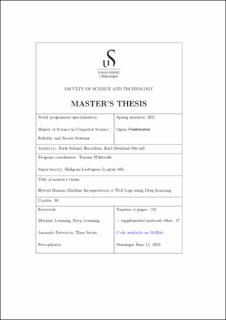| dc.description.abstract | Exploration and production wells in the oil and gas industry produce a vast amount of logging data. All petroleum data from the Norwegian continental shelf must be quality controlled and reported in a structured manner to the Norwegian Petroleum Directorate. Structured data of high quality opens up the possibility of exploring the use of machine learning in the field. Machine learning applications have already improved the efficiency of existing systems, and in some cases replaced them entirely.
This project aims to assist human interpretation of well logs with the use of deep learning methodologies. Quality control and identification of zone boundaries are two time-consuming workflows that could benefit from deep learning. We propose a deep learning based approach for predicting candidate points of interest across a well log. The proposed approach aims to improve the efficiency of the petrophysical workflow by limiting data interpretation to fewer sections. We develop a preprocessing pipeline for well log data, and implement four deep learning algorithms. Additionally, we develop two approaches for model evaluation.
The first evaluation approach achieve an F1 score and Matthews correlation coefficient (MCC) of 0.35 and 0.32 respectively. The second approach achieve a better performance with an F1 score and MCC of 0.54 and 0.49 respectively. The results suggests that our second approach is capable of identifying erroneous data and lithology boundaries. This indicates that our model can be a beneficial addition to the interpretation of well logs. | |
